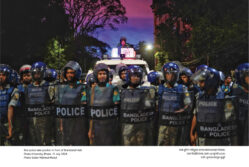Archive Event Highlight

Nagorski Traces Nearly-Forgotten History in ‘Nazi Hunters’
Following the end of World War II, the U.S. and its European allies pivoted immediately to a new mission: to stop the spread of Soviet Communism. The Cold War had begun, Nazis who would have been tried as war criminals suddenly became key resources in the fight against the communists, and the atrocities of the Holocaust seemed ready to be forgotten.
On May 18, 2016, the OPC hosted a book night to discuss OPC member Andrew Nagorski’s book, The Nazi Hunters, which follows government agencies and private counterparts who sought justice despite policies Nagorski called “historical amnesia.”
He said for many of the people who joined the mission to track down war criminals, prosecution and justice were secondary to the desire to simply record what had happened – to make sure it would never be repeated.
“If the official position had been left alone, and there hadn’t been individuals in government and outside of governments who really pushed this and made people confront this again, I think our whole understanding of what happened in this period would be far more limited and pretty myopic.”
In his book, Nagorski challenged some of Hollywood’s myths surrounding Nazi hunters. The idea that Israelis were scouring the globe to find war criminals, for example, is wrong. The Israeli intelligence service, Mossad, did not have the resources to chase Nazis in any meaningful way, he said.
But journals from Nazi fugitives like Adolf Eichmann and Josef Mengele show that they believed those myths and lived in paranoia that Nazi hunters were always on their trail.
Nagorski said prosecutors ran into hurdles early on because the courts had differing notions of what constituted guilt. German courts required individual charges for specific murders or other crimes with direct evidence and witnesses to establish guilt. Since prisoners avoided eye contact with guards, survivors often could not identify the people who committed the crimes.
But this began to turn around when lawyers started arguing that guards working at death camps are guilty simply because of their contribution to the operation of the facility.
“If there’s a gang out there killing every family that has blue eyes, you don’t care who’s the shooter, who’s standing guard, who’s the driver – they’re all guilty. German courts refused to accept that.”
Nagorski traveled to France, Germany, Poland and Israel in the course of his research for the book. His family escaped from Poland during the war and emigrated to the United States. He said hearing stories when growing up prompted a deep interest in the era. Nazi Hunters is his fourth book about World War II.
“I think one of the great legacies of this whole period is that the standard defense of everyone from Eichmann on down was ‘I was just following orders.’ What all these trials have established is that just following orders is not a defense, and in fact in some ways it condemns you when you know what those orders mean.”



